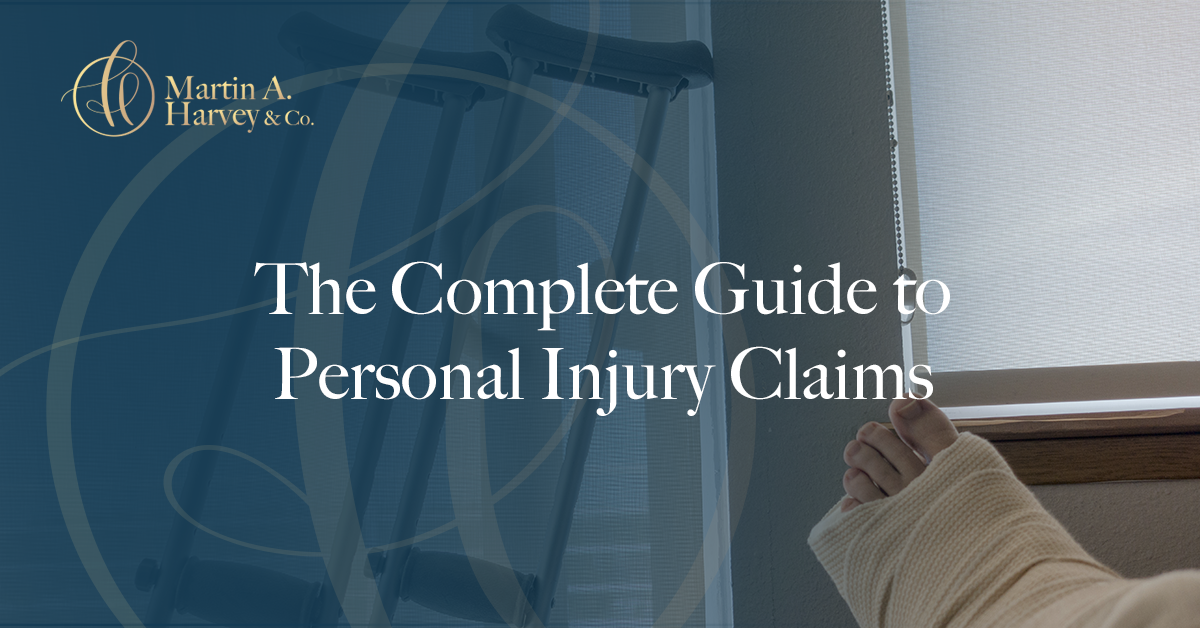Thousands of personal injury claims are made in Ireland each year. Road or motoring accidents are the most common – accounting for 70% of all claims in 2018. But what is a personal injury* claim? And what does the application process entail?
At Martin A. Harvey & Co. Solicitors, we have been helping people for decades to navigate personal injury* claims. This guide is designed to help you to know what to expect during the claims process.
If you have an injury claim case for compensation, please contact us and one of our expert team will help to determine if you have a valid case.
What is a personal injury* claim?
A personal injury* claim refers to the legal action taken by a person after they have been involved in an accident or injured because of the actions or negligence of another person or entity. A claim seeks compensation for the accident or injury such as damages, cost of medical care, loss of wages due to missed work, and psychological trauma.
If you have been involved in an accident where you have suffered injuries as a result of somebody else’s wrong doing, then you may be entitled to make a claim.
Types of personal injury* claims
Most cases will fall under one of the following common personal injury* claim types:
Road Accidents*
Road accidents claims* are any type of accident or injury sustained on the road by road users including motorists, cyclists, and pedestrians. Some examples of these types of claims are:
- Car accidents*
- Pedestrian accidents*
- Rear-end or side-impact collisions*
- Bicycle accidents*
- Motorcycle accidents*
- Accidents due to poorly maintained roads*
- Bus accidents*
- Hit and run Accidents*
- Accidents on the motorway*
- Passenger accidents*
Work Accidents*
Work accident* claims (also known as employer liability* claims) refer to any accident or injury sustained in the workplace as a direct result of the negligence of the employer or fellow employees. Some common accidents or injuries at work include:
- Construction site accidents*
- Farm accidents*
- Dangerous or faulty machinery accidents*
- Health and safety violations*
- Accidents caused by poor lighting*
- Ladder accidents*
- Repetitive strain injuries*
- Faulty personal protective equipment*
- Manual handling injuries*
Public Claims*
Public claims (also known as public liability* claims) refer to any accident or injury sustained in a public place as a result of improperly maintained as a safe environment for public use. Common public accident* claims include:
- Slips, trips and falls in public places*
- Car park accidents*
- Accidents caused by a poorly maintained footpath, public park or a hazardous public space*
- Food poisoning from a restaurant*
- Accidents caused by spillages or wet floors*
Who is involved with a claim?
The Claimant
The Claimant, also known as the Plaintiff, is the injured party making a claim.
The Respondent
The Respondent, also known as the Defendant, is the person or entity who the Claimant holds responsible for the accident or injury.
The Personal Injuries Assessment Board
The Personal Injuries Assessment Board (PIAB) is an independent statutory body that deals with personal injury* claims. All personal injury* claims in Ireland (except for cases involving medical negligence) must be submitted to the PIAB.
The PIAB provides an independent assessment of personal injury* claims for compensation following road traffic, workplace or public liability accidents. If the person you hold responsible for your injury (the Respondent) does not want the PIAB to assess your claim for compensation, you can take your claim to court.
The Solicitors
A solicitor will help look out for your best interest, protect your rights and help provide an accurate picture of the true extent of your injuries and suffering (physical and psychological) either now, or in the future.
They will:
- Take detailed instruction from you
- Uplift a Comprehensive Medical Report from your treating physician
- Prepare and submit a complete Application with the PIAB
- Provide the necessary advice as to whether a PIAB Assessment should be accepted or rejected
- If necessary, arrange for the necessary Court proceedings to be drafted and then represent you in Court
The Insurers
The Respondent’s insurers are typically who is responsible for the payment of an awarded compensation.
How to make a claim
- Speak with a solicitor
- Contact the responsible party
- Establish your medical history
- Fill out an Injury Claim Application
- Submit application
- Awarding of claim
Exceptions to the PIAB process
There are a couple of exceptions to the PIAB emit to assess all Personal Injuries* Actions.
For exclusive psychological or psychiatric injuries, the Board will not assess such claims. However, where there is a psychological or psychiatric element to a personal injuries claim, it is often the case that the Board will proceed to make an assessment in this matter.
The PIAB is also not empowered to deal with medical negligence claims as these are excluded the Personal Injuries Assessment Board Act 2003 as amended.
In general, if a case is complicated in terms of injuries or indeed liability, then the Board will often exercise its discretion and refuse to deal with the case as they are constrained by time limitations.
FAQs about Personal Injury* Claims
How do I know if I have a claim?
Our team of personal injury* specialists can help advise about your case. We will take the time to learn about you and the situation and make sure you understand your rights.
Generally, to be eligible for a claim, you must meet the following criteria:
- You have been in an accident or injured where someone else is at fault
- The accident needs to have happened within the last two years
What type of claims are not assessed?
PIAB does not assess the following claims:
- Medical negligence claims*
- Assault claims*
- Cases, where the injuries sustained, are wholly psychological
PIAB may also decline claims where there are complexities arising from pre-existing medical conditions.
Do I have to instruct a solicitor to make a claim?
No, you are not legally obligated to instruct a solicitor to make a personal injuries* claim. However, suffering from a personal injury can be a very traumatic experience. It can take many forms including physical injury and pain and psychological pain such as fear, anxiety, depression, reduced vitality and psychiatric illness.
This pain and suffering is often ignored by insurance companies if approached directly in order to reach a quick settlement. A solicitor will help look out for your best interest, protect your rights and provide an accurate picture of the true extent of your injuries and suffering either now, or in the future.
Is there an application fee?
There is a fee to submit the application to the PIAB and a fee for
How much are legal fees?
In contentious business, a solicitor may not calculate fees or other charges as a percentage or proportion of any award or settlement.
How long will it take?
On average, claims made to the PIAB are assessed in just over 7 months from when the Respondent consents to have the claim assessed by the PIAB. Personal injury claims taken in the courts can take up to 36 months.
Are there time limits?
Yes, there is a certain window of time in which to make a personal injury* claim following an accident. A Claimant must notify the Respondent within one month of their intent to make a claim. Then, a person has two years less one day from the date of knowledge of their injury to bring a claim forward.
What is the date of knowledge?
The date of knowledge refers to the date on which the injured person gained knowledge of the following facts. In many cases, the date of knowledge will be the day of the accident if the injuries are immediately noticeable. However, in some cases, an injury or illness may not manifest for some time after the accident. In these cases, the date of knowledge is the date they found out they were injured.
The law is different for persons under the age of 18. In law these persons are called minors and the Rules in terms of taking claims and time restrictions are much easier for minors than they are for persons over the age of 18 who are deemed to be legal adults.
A person under the age of 18 has two years from the date of their 18th birthday to take a claim for personal injuries* arising out of an accident during their minority.
What are the award amounts?
The Book of Quantum is a general guide to the amounts that may be awarded, and legislation requires PIAB to regard it when assessing claim values. The Book of Quantum give us a guideline of a value for the injury you have sustained, but there are other factors that may be taken into account when making a claim, such as:
- Loss of earnings, past and future
- Medical bills, past and future
- Other out of pocket expenses, for example, travel costs
Your solicitor will help you interpret the PIAB assessment and together you may come to a decision. Important to note is that you have the final say in whether to settle the case at this stage.
What is Contributory Negligence?
Contributory negligence is when the Claimant is found to have contributed to the situation which caused the accident or increased the severity of their injuries. This will reduce the potential award amount. Consulting an experienced solicitor can help minimise contributory negligence that may prevent you from receiving the maximum compensation to which you are entitled.
Get Started on a Claim
In respect of Personal Injuries* Litigation, our expertise at Martin A Harvey & Co. Solicitors range in the following circumstances:
- Accidents at work/workplace accidents*
- Local authority claims / trip-and-fall cases*
- Road traffic accidents*
- Fatal injuries actions*
- Garda compensation cases*
- Nervous shock / post-traumatic stress cases*
- Criminal Injury Compensation Tribunal*
If you would like to discuss a personal injury* that you have suffered, please contact the team at Martin A Harvey & Co. Solicitors and we would be happy to assist you.
*In contentious business, a solicitor may not calculate fees or other charges as a percentage or proportion of any award or settlement.



